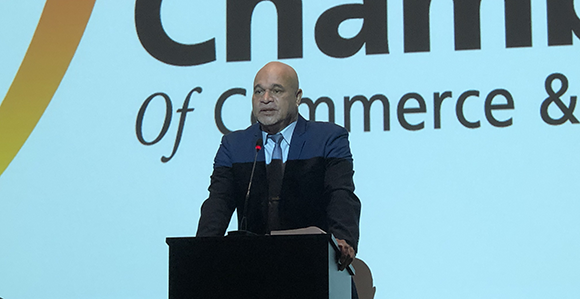Proposed legislative reforms related to foreign investment, land, and arbitration in Papua New Guinea.

PNG’s Lands Minister John Rosso giving an update on the proposed strata title system in PNG in February 2020. Credit: BAI
 Strata title
Strata title
The Department of Lands and Physical Planning through the Land Administration Reform Committee introduced draft legislations that establish and manage a Strata system in PNG. Strata schemes are commonly found in Australian jurisdictions. It refers to a building or a collection of buildings where the property that each individual owns is called a unit and all the owners share ownership of and responsibility for the common areas such as roofs, gardens, driveways. The Strata title vests the owner with ownership over the unit and shared ownership in the common property. The three Strata Bills are intended to improve the administration and facilitation of transactions on units and apartments. They are:
- Strata Title Bill 2020. Provides for the requirements of making an application for strata title.
- Strata Title (Management) Bill 2020. Contains provisions relating to financial management of the established strata title and the establishment of the “Owner’s Corporation”.
- Land Registration (Strata Title) Bill 2020. An extension of the Land Registration Act in that it provides for the process involved in registering the strata plan.
Investment Promotion (Amendment) Bill
PNG’s Investment Promotion Authority has reviewed the Investment Promotion Act 1992 which is notably the key legislation governing foreign investment in the country. The major changes to the existing foreign investment regulation system would include:
- New requirement for minimum investment level. Non-citizen owners of foreign investments will be required to show a minimum investment in PNG in order to obtain their residence visas.
- Reserved activities for PNG citizens. The IPA will continue to reserve activities for citizens under the Reserved Activities List and regularly review the list.
- Promotion of local-foreign partnerships. New ‘Restricted Activities List’ will be introduced to encourage PNG citizen participation in larger, more complex and/or more capital-intensive businesses. Activities will also be identified where foreign investment is allowed under certain conditions, which can include minimum local ownership and minimum investment levels.
- Grandfathering existing businesses. In cases where existing foreign investors are engaged in activities which later become reserved or restricted, they will receive limited exemption from the changes
- Improved compliance and monitoring powers. Government agencies will upgrade their compliance and enforcement capacity and activities
These changes have been made in order to protect micro, small and medium enterprises from competition in business activities that tend to be smaller-scale, onshore, and where PNG citizens have already demonstrated capability.
Arbitration Bill 2019
On 22 June 2019, PNG signed the Instrument of Accession of the Government of Papua New Guinea to the United National Convention on the Recognition and Enforcement of Foreign Arbitral Awards (the New York Convention). On 17 July 2019, PNG became the 160th country to accede to the New York Convention.
By virtue of becoming a signatory to the New York Convention, the National Executive Council gave approval for reforms to be done to the Arbitration Act 1951 (Chapter 46 of the Revised Laws of PNG) through the implementation of new legislation that would give effect to the New York Convention. A draft Arbitration Bill 2019 has been prepared and is currently going through public consultation.
The draft Arbitration Bill 2019 is aimed at improving and encouraging both domestic and international arbitration.
This section was prepared by Dentons PNG for Business Advantage PNG.








Speak Your Mind